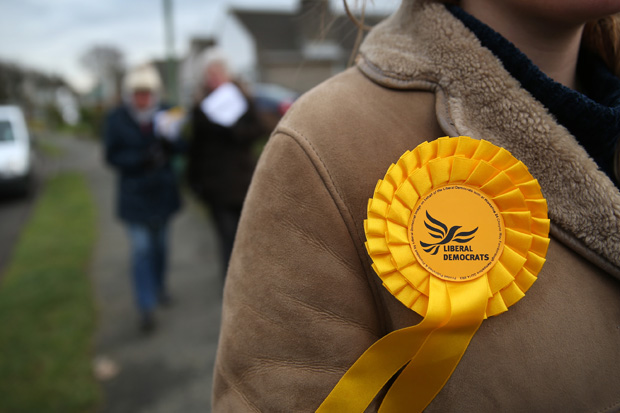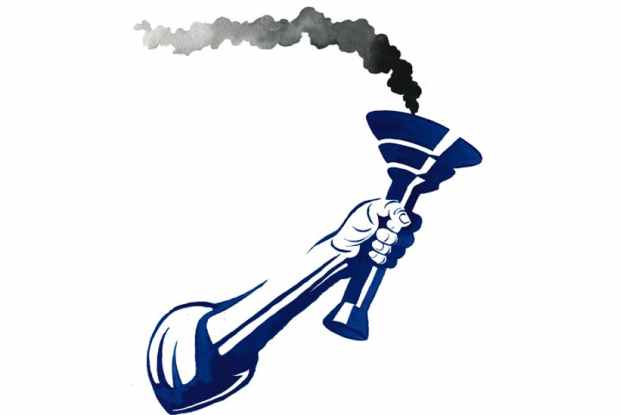Listen
One of the most remarkable features of this parliament has been the sangfroid of the Liberal Democrats. Nothing seems to shake them. The mood of the two main parties is often dictated by the latest opinion polls, but the Liberal Democrats simply laugh off each record low. They weren’t even rattled by the British Election Study, which claimed that on its current performance the party will only win one seat.
What explains this calmness under fire? First, the Lib Dems are determined not to give the media the pleasure of seeing them squeal. Secondly, they know that national polls miss important parts of the story. The Liberal Democrats have collapsed where they don’t have an MP — in the Rochester by-election, they received less than 1 per cent of the vote. But where they do have seats, they are still fighting hard. Moreover, they have confidence in their strategy. They believe that when voters expect a hung parliament, worry about Labour’s capacity to run the country and distrust the Tories’ motives, the Lib Dems will prove attractive.
But the strategy has hit a major snag: they are being written out of the election script. The SNP has taken the role that the Lib Dems were expecting to play. When the two Eds, Miliband and Balls, and other members of the shadow cabinet appear on television, they are grilled not on their terms for a deal with the Lib Dems but on whether they could make common cause with the SNP. Nicola Sturgeon’s speech in London last week, reiterating the nationalists’ demands in the event of a hung parliament, eclipsed Nick Clegg’s attempt to set out his priorities.
What makes the problem worse is that the Labour-Tory battle in Westminster is becoming increasingly ferocious. The Liberal Democrats have failed to make themselves heard in the row over tax avoidance, despite having pushed consistently to tighten the lax rules that Labour left behind. As one influential Lib Dem laments, ‘The media loves a fight, and they love a Labour-Tory fight.’ Inside Clegg’s office they are pinning their hopes on the fact that the broadcasters will be obliged by regulations to put them on air during the election campaign.
Few things sum up the Liberal Democrats’ problems better than the proposed TV debates. In 2010, these gave the party the biggest polling boost in its history. This time the Lib Dems are shut out of the main debate. Instead, they have been confined to the two proposed seven-way debates, at which Clegg risks being the whipping boy. The other leaders will relish saying, ‘I disagree with Nick.’
Senior Lib Dems fear that lack of coverage could do them serious damage. In private, Liberal Democrat ministers admit that the party is unlikely to hold more than a handful of the seats where Labour came second to it in 2010. And only a few seats in Scotland are safe from the SNP surge. So the key to the Lib Dems’ electoral performance will be how they do against the Tories. If they are going to keep more than half their seats — the minimum acceptable return — they will have to beat back their coalition partners.
The plan for doing this, once again, looks fine at first glance. The Lib Dems will emphasise that they will make the Tories cut the deficit in a ‘fairer’ way and force them to protect spending on education. At the same time, they’ll say that they’ll make Labour fiscally responsible, ensuring that the books are balanced. But their worry is that the more they are squeezed out of the news, the harder it will be for them to get this message across. It will become far simpler for the Tories to persuade voters in these seats that you have to vote for them because Miliband is too much of a risk with the economy.
The party is in some ways its own worst enemy. You don’t have to go far to find a Liberal Democrat with a gripe about the Deputy Prime Minister’s office. One complains that it contains ‘too many chefs, not enough cooks’. The more substantial criticism is that the Lib Dems have wound the government down too early. The coalition is still in office, but it is now simply biding time until the election campaign proper gets under way. The Liberal Democrats are insisting that the 18 March budget should be a limited affair. They don’t want to be seen doing too much business with the Tories so close to polling day.
Yet a proper budget would turn attention to the Liberal Democrats and the influence they have wielded in government, where they have punched above their weight. It would prove the point often made by Danny Alexander, Chief Secretary to the Treasury, that the Liberal Democrats are the only party offering to continue the economic policies that the coalition has pursued in this parliament.
The Liberal Democrat consensus, though, is that they don’t do well out of budgets. One coalition veteran complains, ‘The only budget we got good coverage for is the one that was leaked. It is Osborne’s day.’ There is no getting round the fact that it is the Chancellor who stands at the dispatch box to deliver the statement. But the Lib Dems would benefit from stressing what they, in coalition, have done for the economy. It would remind voters of their relevance.
There is, however, little sign of sympathy for the Liberal Democrats from their coalition partners. When I’ve discussed with several people in No. 10 the possibility that Nick Clegg might lose his Sheffield Hallam seat to Labour unless he can squeeze the Tory vote there, they’ve just chuckled. Yet no matter how amusing the Tories find the plight of their coalition partners, they’d be well advised to remember that every seat the Liberal Democrats lose to Labour makes it more likely that Ed Miliband will be Prime Minister.
Got something to add? Join the discussion and comment below.
Get 10 issues for just $10
Subscribe to The Spectator Australia today for the next 10 magazine issues, plus full online access, for just $10.
You might disagree with half of it, but you’ll enjoy reading all of it. Try your first month for free, then just $2 a week for the remainder of your first year.















Comments
Don't miss out
Join the conversation with other Spectator Australia readers. Subscribe to leave a comment.
SUBSCRIBEAlready a subscriber? Log in